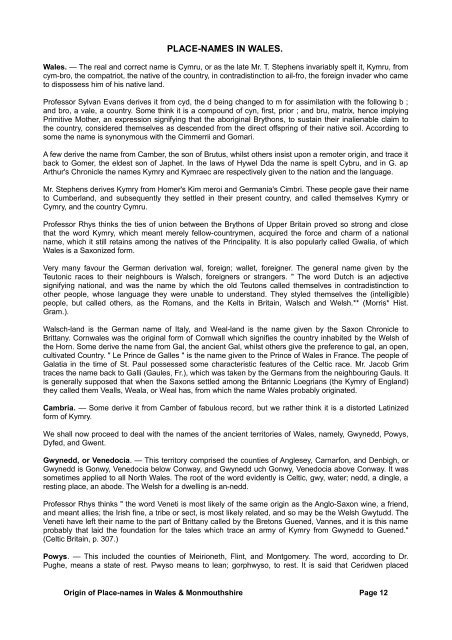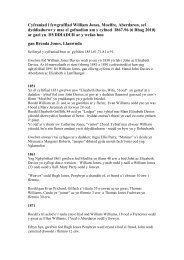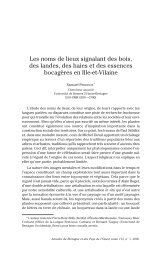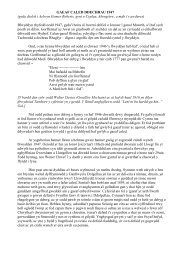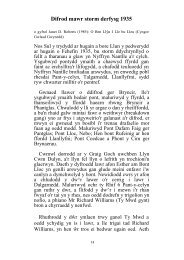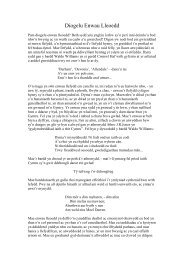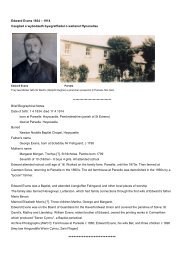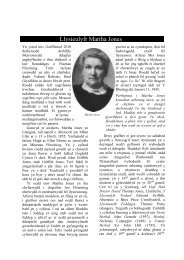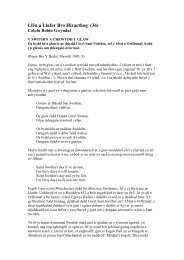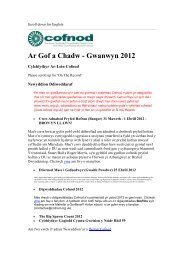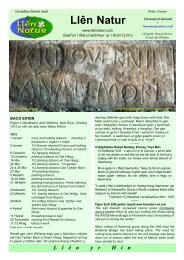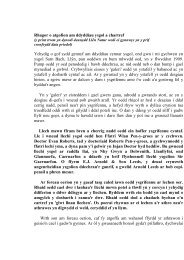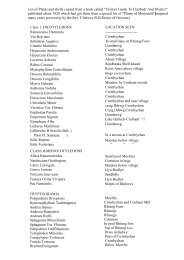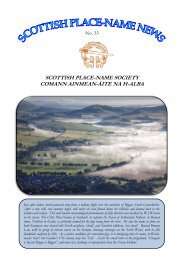Rhos means a moor. Some th<strong>in</strong>k <strong>the</strong> Lat<strong>in</strong> rus is a cognate word, signify<strong>in</strong>g undra<strong>in</strong>ed moorl<strong>and</strong>. The Cymricrhos is frequently confused with <strong>the</strong> Gaelic ros, which signifies a promontory. Ross, <strong>the</strong> name <strong>of</strong> a town <strong>in</strong>Herefordshire, is probably a corruption <strong>of</strong> <strong>the</strong> former.Rhyd <strong>in</strong> its primary sense means a ford, but its secondary mean<strong>in</strong>g - a stream, is frequently given to it. Rhyderw<strong>in</strong>means <strong>the</strong> rough, dangerous ford, whereas Rhydfel<strong>in</strong> designates a stream <strong>of</strong> water that turns a mill.Sakn is <strong>the</strong> Welsh for <strong>the</strong> old Roman paved road, <strong>and</strong> wherever it occurs one may almost certa<strong>in</strong>ly f<strong>in</strong>dtraces <strong>of</strong> a Roman road. Unlike almost every o<strong>the</strong>r road <strong>the</strong> Roman strata was dist<strong>in</strong>guished for itsstraightness. It ran from fortress to fortress, as straight as an arrow course, <strong>in</strong> order to facilitatecommunications between those who were stationed <strong>in</strong> <strong>the</strong> chief strategic positions <strong>of</strong> Brita<strong>in</strong>. It was generallyabout 15 feet wide, <strong>the</strong> sides be<strong>in</strong>g fenced by huge stones, <strong>and</strong> <strong>the</strong> middle well paved. Rema<strong>in</strong>s <strong>of</strong> it are stilldiscernible <strong>in</strong> many parts <strong>of</strong> <strong>the</strong> Pr<strong>in</strong>cipality, such as <strong>the</strong> neighbourhood <strong>of</strong> Caersws, Montgomery; Gaer,Brecon; Neath, Glamorgan; <strong>and</strong> many o<strong>the</strong>r <strong>place</strong>s.Tal when applied to <strong>place</strong>s means end, but when applied to persons it denotes front. Talies<strong>in</strong> means radiantfront or lum<strong>in</strong>ous head, but Talybont signifies <strong>the</strong> end <strong>of</strong> <strong>the</strong> bridge. From this comes <strong>the</strong> English tall.Ton <strong>orig<strong>in</strong></strong>ally meant a piece <strong>of</strong> unploughed or uncultivated l<strong>and</strong>, perhaps from twn, which implies a piece <strong>of</strong>l<strong>and</strong> taken for <strong>the</strong> purpose <strong>of</strong> cultivation. It is used <strong>in</strong> Glamorgan to denote a green. sward.Tref was <strong>the</strong> primitive Welsh appellative for a homestead, a dwell<strong>in</strong>g-house. Myned tua thref go<strong>in</strong>g home, isstill a common expression <strong>in</strong> South Wales. In course <strong>of</strong> time <strong>the</strong> term was extended to <strong>in</strong>dicate a group <strong>of</strong>homesteads. Hav<strong>in</strong>g built a house for himself <strong>the</strong> lord would proceed to build dwell<strong>in</strong>gs for his people <strong>and</strong> hiscattle, <strong>and</strong> <strong>the</strong>se formed what was called tref. The word gradually became to be applied to an aggregate <strong>of</strong>houses, hence <strong>the</strong> reason why it is used so frequently <strong>in</strong> village as well as <strong>in</strong> town-<strong>names</strong>.The root is widely distributed over Brita<strong>in</strong> <strong>and</strong> Europe. The Norse by, <strong>the</strong> Danish thorpe, <strong>the</strong> German dorf,<strong>and</strong> <strong>the</strong> English ham <strong>and</strong> ton may be considered as its equivalents. It is spelt treu <strong>in</strong> Domesday Book, hencewe have Treuddyn for Treddyn.- Hendref forms <strong>the</strong> <strong>names</strong> <strong>of</strong> many old mansions, <strong>and</strong> is synonymous with <strong>the</strong> English Aldham <strong>and</strong> Oldham.Hydref (October) was <strong>the</strong> harvest season - <strong>the</strong> time to ga<strong>the</strong>r <strong>the</strong> produce <strong>of</strong> <strong>the</strong> fields to <strong>the</strong> barns, <strong>and</strong>leave <strong>the</strong> hafod, summer-house, to spend <strong>the</strong> w<strong>in</strong>ter months <strong>in</strong> <strong>the</strong> hendref, <strong>the</strong> older establishment. The<strong>orig<strong>in</strong></strong>al mean<strong>in</strong>g <strong>of</strong> cantref (canton or hundred) is supposed to have been a hundred homesteads.Troed is <strong>the</strong> Welsh for foot, base. The Irish traig signifies <strong>the</strong> same, both <strong>of</strong> which, Pr<strong>of</strong>essor Rhys th<strong>in</strong>ks, are<strong>of</strong> <strong>the</strong> same <strong>orig<strong>in</strong></strong> as <strong>the</strong> Greek trecho, " I run." The English tread means to set <strong>the</strong> foot. The word isfrequently applied to <strong>place</strong>s situated at <strong>the</strong> foot <strong>of</strong> a mounta<strong>in</strong>. The Welsh Troedyrhiw <strong>and</strong> <strong>the</strong> Italian pie dimonte are almost synonymous terms.Ty generally means a house, a dwell<strong>in</strong>g-<strong>place</strong>, but <strong>in</strong> Welsh nomenclature it is occasionally used to denote achurch or <strong>place</strong> <strong>of</strong> worship, as. Ty Ddewi, St. David's. The house <strong>of</strong> God is considered by many as equivalentto <strong>the</strong> church <strong>of</strong> God. Ty has an <strong>in</strong>ferior mean<strong>in</strong>g to bod ; <strong>the</strong> latter was <strong>the</strong> residence <strong>of</strong> a superior, <strong>and</strong> <strong>the</strong>former is <strong>of</strong> a later date, signify<strong>in</strong>g an ord<strong>in</strong>ary house, a cottage.WrY — Gwy is an obsolete Celtic word for water, mostly used as a suffix <strong>in</strong> river-<strong>names</strong>, as Elwy, Tawy; <strong>and</strong>sometimes "as a prefix, as gwyach, a water- fowl; gwylan, sea-gull; gwydd, goose. Gwysg is related to it,which means a tendency to a level, as <strong>of</strong> a fluid or stream. We f<strong>in</strong>d <strong>the</strong> root <strong>in</strong> various forms, as Wysg task,uisge, usk, esh, ex, is-ca, &c.Ynys anciently signified, a quasi-isl<strong>and</strong> <strong>in</strong> <strong>the</strong> marshes, answer<strong>in</strong>g to <strong>in</strong>ch <strong>in</strong> Scotl<strong>and</strong>, Inch Keith; <strong>and</strong> <strong>in</strong>is orennis is Irel<strong>and</strong>, Ennis Killen, Ennis Corthy, Inniskea, &c„ The word is applied to some <strong>place</strong>s with no river orwater near <strong>the</strong>m, nor anyth<strong>in</strong>g suggest<strong>in</strong>g <strong>the</strong> probability that <strong>the</strong>y had, <strong>in</strong> remote times, been isl<strong>and</strong>s.Ystrad is a general term for a low or flat valley through which a river flows. The Lat<strong>in</strong> strata, <strong>the</strong> Scotchstrath, <strong>and</strong> <strong>the</strong> English street are supposed to be <strong>of</strong> <strong>the</strong> same <strong>orig<strong>in</strong></strong>. The term ystrad was used sometimes todenote a paved road.Orig<strong>in</strong> <strong>of</strong> Place-<strong>names</strong> <strong>in</strong> Wales & Monmouthshire Page 11
PLACE-NAMES IN WALES.Wales. — The real <strong>and</strong> correct name is Cymru, or as <strong>the</strong> late Mr. T. Stephens <strong>in</strong>variably spelt it, Kymru, fromcym-bro, <strong>the</strong> compatriot, <strong>the</strong> native <strong>of</strong> <strong>the</strong> country, <strong>in</strong> contradist<strong>in</strong>ction to ail-fro, <strong>the</strong> foreign <strong>in</strong>vader who cameto dispossess him <strong>of</strong> his native l<strong>and</strong>.Pr<strong>of</strong>essor Sylvan Evans derives it from cyd, <strong>the</strong> d be<strong>in</strong>g changed to m for assimilation with <strong>the</strong> follow<strong>in</strong>g b ;<strong>and</strong> bro, a vale, a country. Some th<strong>in</strong>k it is a compound <strong>of</strong> cyn, first, prior ; <strong>and</strong> bru, matrix, hence imply<strong>in</strong>gPrimitive Mo<strong>the</strong>r, an expression signify<strong>in</strong>g that <strong>the</strong> ab<strong>orig<strong>in</strong></strong>al Brythons, to susta<strong>in</strong> <strong>the</strong>ir <strong>in</strong>alienable claim to<strong>the</strong> country, considered <strong>the</strong>mselves as descended from <strong>the</strong> direct <strong>of</strong>fspr<strong>in</strong>g <strong>of</strong> <strong>the</strong>ir native soil. Accord<strong>in</strong>g tosome <strong>the</strong> name is synonymous with <strong>the</strong> Cimmerrii <strong>and</strong> Gomari.A few derive <strong>the</strong> name from Camber, <strong>the</strong> son <strong>of</strong> Brutus, whilst o<strong>the</strong>rs <strong>in</strong>sist upon a remoter <strong>orig<strong>in</strong></strong>, <strong>and</strong> trace itback to Gomer, <strong>the</strong> eldest son <strong>of</strong> Japhet. In <strong>the</strong> laws <strong>of</strong> Hywel Dda <strong>the</strong> name is spelt Cybru, <strong>and</strong> <strong>in</strong> G. apArthur's Chronicle <strong>the</strong> <strong>names</strong> Kymry <strong>and</strong> Kymraec are respectively given to <strong>the</strong> nation <strong>and</strong> <strong>the</strong> language.Mr. Stephens derives Kymry from Homer's Kim meroi <strong>and</strong> Germania's Cimbri. These people gave <strong>the</strong>ir nameto Cumberl<strong>and</strong>, <strong>and</strong> subsequently <strong>the</strong>y settled <strong>in</strong> <strong>the</strong>ir present country, <strong>and</strong> called <strong>the</strong>mselves Kymry orCymry, <strong>and</strong> <strong>the</strong> country Cymru.Pr<strong>of</strong>essor Rhys th<strong>in</strong>ks <strong>the</strong> ties <strong>of</strong> union between <strong>the</strong> Brythons <strong>of</strong> Upper Brita<strong>in</strong> proved so strong <strong>and</strong> closethat <strong>the</strong> word Kymry, which meant merely fellow-countrymen, acquired <strong>the</strong> force <strong>and</strong> charm <strong>of</strong> a nationalname, which it still reta<strong>in</strong>s among <strong>the</strong> natives <strong>of</strong> <strong>the</strong> Pr<strong>in</strong>cipality. It is also popularly called Gwalia, <strong>of</strong> whichWales is a Saxonized form.Very many favour <strong>the</strong> German derivation wal, foreign; wallet, foreigner. The general name given by <strong>the</strong>Teutonic races to <strong>the</strong>ir neighbours is Walsch, foreigners or strangers. " The word Dutch is an adjectivesignify<strong>in</strong>g national, <strong>and</strong> was <strong>the</strong> name by which <strong>the</strong> old Teutons called <strong>the</strong>mselves <strong>in</strong> contradist<strong>in</strong>ction too<strong>the</strong>r people, whose language <strong>the</strong>y were unable to underst<strong>and</strong>. They styled <strong>the</strong>mselves <strong>the</strong> (<strong>in</strong>telligible)people, but called o<strong>the</strong>rs, as <strong>the</strong> Romans, <strong>and</strong> <strong>the</strong> Kelts <strong>in</strong> Brita<strong>in</strong>, Walsch <strong>and</strong> Welsh.** (Morris* Hist.Gram.).Walsch-l<strong>and</strong> is <strong>the</strong> German name <strong>of</strong> Italy, <strong>and</strong> Weal-l<strong>and</strong> is <strong>the</strong> name given by <strong>the</strong> Saxon Chronicle toBrittany. Corn<strong>wales</strong> was <strong>the</strong> <strong>orig<strong>in</strong></strong>al form <strong>of</strong> Cornwall which signifies <strong>the</strong> country <strong>in</strong>habited by <strong>the</strong> Welsh <strong>of</strong><strong>the</strong> Horn. Some derive <strong>the</strong> name from Gal, <strong>the</strong> ancient Gal, whilst o<strong>the</strong>rs give <strong>the</strong> preference to gal, an open,cultivated Country. " Le Pr<strong>in</strong>ce de Galles " is <strong>the</strong> name given to <strong>the</strong> Pr<strong>in</strong>ce <strong>of</strong> Wales <strong>in</strong> France. The people <strong>of</strong>Galatia <strong>in</strong> <strong>the</strong> time <strong>of</strong> St. Paul possessed some characteristic features <strong>of</strong> <strong>the</strong> Celtic race. Mr. Jacob Grimtraces <strong>the</strong> name back to Galli (Gaules, Fr.), which was taken by <strong>the</strong> Germans from <strong>the</strong> neighbour<strong>in</strong>g Gauls. Itis generally supposed that when <strong>the</strong> Saxons settled among <strong>the</strong> Britannic Loegrians (<strong>the</strong> Kymry <strong>of</strong> Engl<strong>and</strong>)<strong>the</strong>y called <strong>the</strong>m Vealls, Weala, or Weal has, from which <strong>the</strong> name Wales probably <strong>orig<strong>in</strong></strong>ated.Cambria. — Some derive it from Camber <strong>of</strong> fabulous record, but we ra<strong>the</strong>r th<strong>in</strong>k it is a distorted Lat<strong>in</strong>izedform <strong>of</strong> Kymry.We shall now proceed to deal with <strong>the</strong> <strong>names</strong> <strong>of</strong> <strong>the</strong> ancient territories <strong>of</strong> Wales, namely, Gwynedd, Powys,Dyfed, <strong>and</strong> Gwent.Gwynedd, or Venedocia. — This territory comprised <strong>the</strong> counties <strong>of</strong> Anglesey, Carnarfon, <strong>and</strong> Denbigh, orGwynedd is Gonwy, Venedocia below Conway, <strong>and</strong> Gwynedd uch Gonwy, Venedocia above Conway. It wassometimes applied to all North Wales. The root <strong>of</strong> <strong>the</strong> word evidently is Celtic, gwy, water; nedd, a d<strong>in</strong>gle, arest<strong>in</strong>g <strong>place</strong>, an abode. The Welsh for a dwell<strong>in</strong>g is an-nedd.Pr<strong>of</strong>essor Rhys th<strong>in</strong>ks " <strong>the</strong> word Veneti is most likely <strong>of</strong> <strong>the</strong> same <strong>orig<strong>in</strong></strong> as <strong>the</strong> Anglo-Saxon w<strong>in</strong>e, a friend,<strong>and</strong> meant allies; <strong>the</strong> Irish f<strong>in</strong>e, a tribe or sect, is most likely related, <strong>and</strong> so may be <strong>the</strong> Welsh Gwytudd. TheVeneti have left <strong>the</strong>ir name to <strong>the</strong> part <strong>of</strong> Brittany called by <strong>the</strong> Bretons Guened, Vannes, <strong>and</strong> it is this nameprobably that laid <strong>the</strong> foundation for <strong>the</strong> tales which trace an army <strong>of</strong> Kymry from Gwynedd to Guened."(Celtic Brita<strong>in</strong>, p. 307.)Powys. — This <strong>in</strong>cluded <strong>the</strong> counties <strong>of</strong> Meirioneth, Fl<strong>in</strong>t, <strong>and</strong> Montgomery. The word, accord<strong>in</strong>g to Dr.Pughe, means a state <strong>of</strong> rest. Pwyso means to lean; gorphwyso, to rest. It is said that Ceridwen <strong>place</strong>dOrig<strong>in</strong> <strong>of</strong> Place-<strong>names</strong> <strong>in</strong> Wales & Monmouthshire Page 12
- Page 1 and 2: HANDBOOK OF THE ORIGIN OF PLACE-NAM
- Page 3 and 4: § § § § §The Author begs to st
- Page 5 and 6: pitiful cries of the railway offici
- Page 7 and 8: Bishop Percy says that "in England,
- Page 9 and 10: The city of Chester is still popula
- Page 11 and 12: There's Cumwhitton, Cumwhinton, Cum
- Page 13: Llwyn in its primary' sense means a
- Page 17 and 18: Church are generally dedicated to e
- Page 19 and 20: think he was a contemporary of St.
- Page 21 and 22: Rhosbeirio. — Rhos, a moor, a dry
- Page 23 and 24: of Brecknock," states that this vic
- Page 25 and 26: Cam cnwir ef Cwmdu,Cwm gwyn yw & n
- Page 27 and 28: Penderyn. — A corruption probably
- Page 29 and 30: Ardudwy. — Ar, upon or above; tud
- Page 31 and 32: to mark its pre-eminence over the o
- Page 33 and 34: Some think that eirw is a corruptio
- Page 35 and 36: present form — Caerfyrddin.Abergw
- Page 37 and 38: place of refuge; hence the name. En
- Page 39 and 40: Llansawyl. — The church was dedic
- Page 41 and 42: eject. The village took its name fr
- Page 43 and 44: house, and attempted to kill an inf
- Page 45 and 46: Gwydir. — Prima facie one may tak
- Page 47 and 48: Nefyn. — The church was probably
- Page 49 and 50: DENBIGHSHIRE.Anglicized form of Din
- Page 51 and 52: Llangollen. — From Collen, a sain
- Page 53 and 54: hands into their pockets to pay a c
- Page 55 and 56: Cefn. — The name signifies a ridg
- Page 57 and 58: Maesgarmon. — Named in honour of
- Page 59 and 60: Abertridwr. — Tridwr, three water
- Page 61 and 62: it is said, was originally built by
- Page 63 and 64: Cwmllynfell. — Cwm, a narrow vale
- Page 65 and 66:
Gwarycaeau. — Gwdr, the nape of t
- Page 67 and 68:
means a cultivated region, a vale,
- Page 69 and 70:
Penrhiwfer.- Pen, head, top; rhiw,
- Page 71 and 72:
Port Talbot. — So called in 1835
- Page 73 and 74:
Trealaw. — This appellation was g
- Page 75 and 76:
Aberdyfi. — So called from its si
- Page 77 and 78:
Llanddwywe. — From Dwywau, a desc
- Page 79 and 80:
Crickhowell and some in the directi
- Page 81 and 82:
Griffithstown. — This village was
- Page 83 and 84:
and gwy, water. Treiddiod troth tna
- Page 85 and 86:
derive Tintern from din, fortified
- Page 87 and 88:
Caersws. — It appears that the Ro
- Page 89 and 90:
English name — Ervylton.Llanymech
- Page 91 and 92:
Angle. — Probably from the angle-
- Page 93 and 94:
Gellyswick. — Another hybrid. Gel
- Page 95 and 96:
that the two rivers in their flowin
- Page 97 and 98:
ecame the bishop of the see, and wa
- Page 99 and 100:
earth formerly stood on a summit on
- Page 101 and 102:
Pilleth. — A corruption of pwll,
- Page 103 and 104:
Howells, Rev. J., Mountain AshHowel
- Page 105 and 106:
Williams, D., PenywernWilliams, Rev


